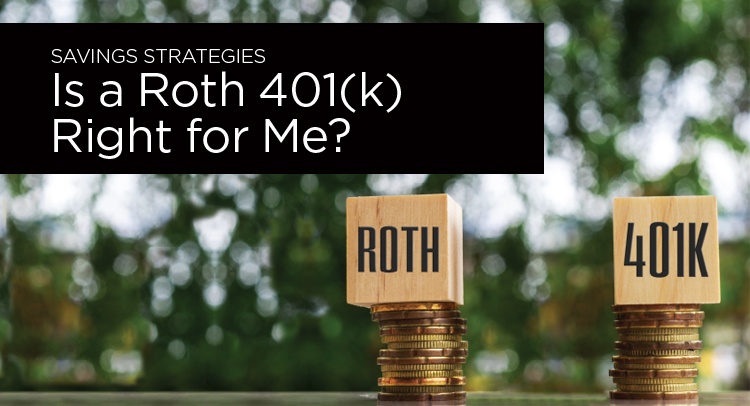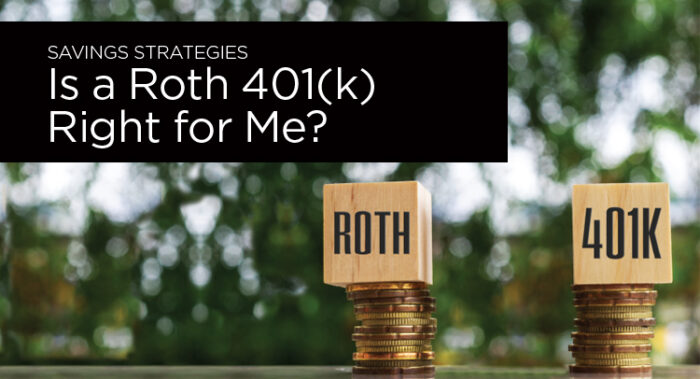
IS THE ROTH 401(k) RIGHT FOR ME?
January 14, 2020
The Economic Growth and Tax Relief Reconciliation Act of 2001 introduced the Roth 401(k) as a retirement plan that employers may offer to their employees as of January 1, 2006. Of course, there are questions that need to be considered, the most important being, should you contribute to a Roth 401(k)?
What is the Roth 401(k)?
The Roth 401(k) is a salary-deferral program similar to a traditional 401(k) plan. It allows employees to defer money into the plan to accumulate funds for retirement. For 2019, the deferral limit for the
Roth 401(k) is $19,000, plus a catch-up contribution limit of $6,000 for individuals age 50 or older.
Key features of the Roth 401(k)
- Roth 401(k) deferrals are subject to income tax the year they are deferred.
- Roth 401(k) deferrals are held separate from all pretax 401(k) monies.
- Roth 401(k) money can be rolled directly into a Roth IRA.
- Plan participants must specify what portion of the deferrals are Roth 401(k) deferrals versus traditional 401(k) deferrals.
- Participants can combine Roth 401(k) and traditional 401(k) deferrals to reach contribution maximums.
- As a plan participant, you have the ability to
roll money into a Roth IRA to avoid being subject to required minimum distribution
(RMD) regulations.
Can I still receive my employer’s match? Yes, you can receive your employer’s matching contributions; however, all employer money will remain as pretax contributions to the account.
How are distributions treated?
Qualified distributions from the Roth 401(k) are tax free and will not increase your taxable income at retirement. Qualified distributions from the Roth 401(k) are subject to a five-year waiting period, plus additional requirements specified in the plan document. In addition, the Roth 401(k), unlike the Roth IRA, is subject to RMD rules at age 70½ (or retirement, whichever is later).
What are some additional benefits?
- No income restrictions. Unlike the
Roth IRA, the Roth 401(k) does not have income restrictions for contributions. No matter what your household income, you can elect to contribute to the Roth 401(k).
- Increased contribution limits. Unlike the Roth IRA, the contribution limits are higher for tax-free savings. Additionally, if you meet the
Roth IRA income limits, you can maximize your contributions to the Roth 401(k) and the
Roth IRA.
- Legacy planning. With the ability to roll the money into the Roth IRA, you will not be subjected to the RMD requirements of the Roth 401(k) and can create a tax-free, stretch IRA.
So, how do I know if it’s right for me?1
Let’s assume that you are 35 years old, earning $40,000 annually, in the 24-percent tax bracket, and planning to retire at age 65. You are deferring 10 percent of your annual salary.
Same take-home pay. This option (see table on next page) shows Roth 401(k) contributions based on keeping your paycheck deductions and take-home pay the same as if contributing to a traditional
401(k) plan. Your net contribution to the Roth 401(k) would be lower than the contribution to the traditional 401(k) plan.
If, upon retirement, you are in the same 24-percent tax bracket, the Roth 401(k) will be worth the same amount as the traditional 401(k)
Results Summary* | ||
Traditional 401(k) | Roth 401(k) | |
Net annual contributions | $4,000 | $3,040 |
Balance at retirement | $404,292 | $303,219 |
Taxes for IRA at retirement | –$97,030 | $0 |
Value at retirement (age 65) | $307,262 | $307,262 |
*Assumptions:
- 7-percent annual growth rate; contributions are made at the beginning of the year.
- You are investing savings from pretax deferrals, and the savings are growing at the same rate as the 401(k) contributions.
- These illustrations do not account for any increase in salary or bonuses you may receive.
- You are paying the income taxes due on the Roth 401(k) deferrals each year. This example also does not account for any complex tax situation you may have.
Reduced take-home pay. This option shows Roth 401(k) contributions based on increasing your paycheck deductions for current taxes, thereby reducing your take-home pay. Your net contribution to the Roth 401(k) would be the same as your contribution to a traditional 401(k).
Results Summary | ||
Traditional 401(k) | Roth 401(k) | |
Net annual contributions | $4,000 | $4,000 |
Balance at retirement | $404,292 | $404,292 |
Taxes for IRA at retirement | –$97,030 | $0 |
Value at retirement (age 65) | $307,262 | $404,292 |
In closing . . .
The Roth 401(k) is a great savings opportunity for many people and not just for highly compensated employees. It can provide participants with a tax-advantaged way to save for retirement and can provide flexibility and choice to retirees. The Roth 401(k) is an important consideration in putting you a step ahead in supporting your desired retirement lifestyle.
Commonwealth Financial Network® does not provide tax or legal advice. Please contact your tax or legal professional regarding your individual situation.


